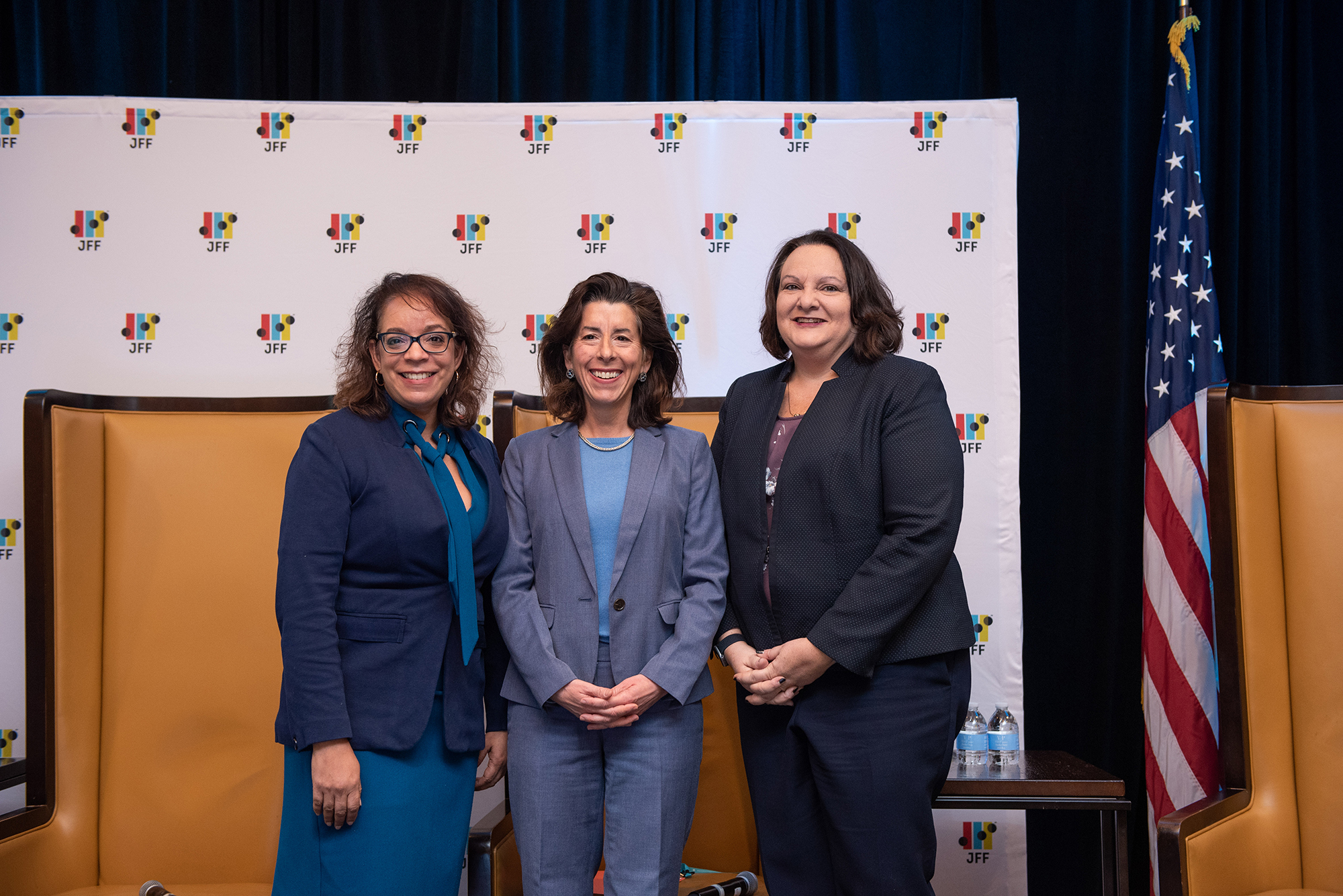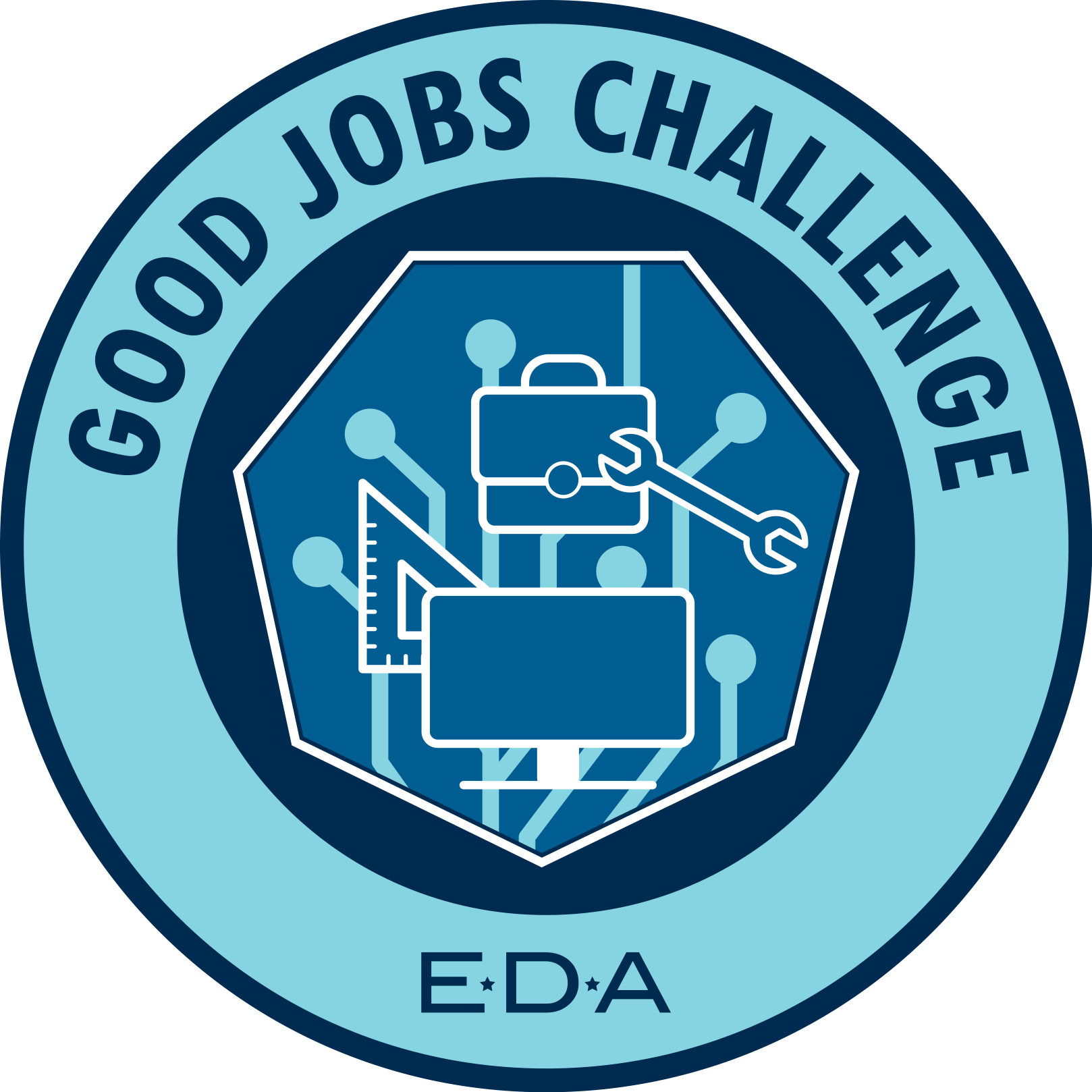
JFF Helps Good Jobs Challenge Grantees Develop Quality Jobs
June 1, 2023
At a Glance
Jobs for the Future is providing technical assistance to the 32 regional partnerships working to expand access to quality jobs in the Economic Development Administration’s $500 million Good Jobs Challenge
At Jobs for the Future (JFF), we’re actively involved in the ongoing national conversation about the need to expand access to quality jobs.
As part of our mission to drive equitable economic advancement for all, we’re committed to helping improve job quality in the U.S. economy. Toward that end, we’re developing a resource we call the Quality Jobs Framework, which lays out an approach to creating jobs that offer what all workers deserve—not just a living wage and good benefits but also stability, flexibility, autonomy, and career advancement opportunities. We’re also playing a key role in the federal government’s Good Jobs Challenge (GJC), an American Rescue Plan initiative that’s led by the U.S. Economic Development Administration (EDA), a bureau of the U.S. Department of Commerce.
The Need
The importance of job quality became crystal clear amid the economic upheaval brought on by the COVID-19 pandemic and during the ensuing Great Resignation, but signs of an overall decline in job quality had emerged much earlier. This is a persistent problem, and leaders across the learn and work ecosystem must come together to solve it. Low-quality jobs cause chronic feelings of economic insecurity for the people who hold them, and they impose constraints on employers, industries, and the economy as a whole. For example, they’re often associated with high turnover rates, which are costly to employers. And because they pay low wages, they limit the purchasing power of a large segment of the population, curbing demand for goods and services and thereby limiting the potential for economic growth.
This is a persistent problem, and leaders across the learn and work ecosystem must come together to solve it.
By investing time, money, and other resources into coordinated cross-sector efforts to increase the number of quality jobs, we can improve the lives of millions of people and drive economic activity that fuels an ongoing cycle of growth that organically creates new opportunities for equitable economic advancement.
The GJC Kick-Starts Much-Needed Work
The Good Jobs Challenge (GJC) is one of several federal government programs that will play a role in kick-starting the types of collaborative initiatives needed to expand access to quality jobs. Other examples include the Department of Commerce’s launch of the Job Quality Toolkit and its collaboration with the U.S. Department of Labor in the Good Jobs Initiative.
Funded by the American Rescue Plan, the Good Jobs Challenge has awarded a total of $500 million in grants to 32 regional workforce partnerships that are using the funds to develop industry-led training programs with the goal of placing 50,000 U.S. workers into quality jobs.
JFF is proud to partner with the EDA in the program as leader of the GJC’s national Community of Practice. In this role, we’re providing guidance and support by helping grantees build professional networks, engage in peer learning, and share best practices. We’re also providing them with technical assistance to ensure that the training programs they create support equitable economic advancement for participants. Thus far, we have provided individual coaching to each grantee, including connections to external subject matter experts to ensure that they have the resources they need to succeed.

Assistant Secretary of Commerce for Economic Development Alejandra Y. Castillo, Secretary of Commerce Gina Raimondo, and JFF CEO Maria Flynn pose for a photo at the December 2022 convening of the Good Jobs Challenge grantees, hosted by JFF and EDA.
Grantees are required to collaborate with employers, and the projects they launched include sector partnerships in which employers from industries that are vital to regional economies work with a diverse array of other stakeholders, including workforce development boards, community colleges, economic development organizations, chambers of commerce, and community development finance institutions.
Employers are in the driver’s seat of these initiatives, providing critical input aligned with rigorous data analysis to inform the development of the new training programs. But ultimately, the projects are truly collaborative efforts that bring together the insights and ideas of multiple parties from across the learn and work ecosystem—many of whom are participating in a regional workforce development initiative for the first time. And in that way, they embody the approach we have laid out in the JFF Quality Jobs Framework.
To improve job quality, employers must think about ‘aspects of the job that go beyond the job description and how they can implement those aspects that might be missing.'
— Tracy Ariel, Program Director, Connecticut Office of Workforce Strategy
With an emphasis on equity, the projects also seek to remove systemic barriers that have limited access to quality jobs. Toward that end, their training programs will include holistic support services for participants. Once participants complete training, grantees work with local employers committed to hiring candidates.
Emphasizing Quality Jobs in Connecticut
The project led by the Connecticut Office of Workforce Strategy (OWS), the Strengthening Sectoral Partnerships Initiative, offers a good example of how the GJC initiative emphasizes quality jobs. The OWS received a GJC grant of more than $21 million to develop a “robust, statewide approach” to training thousands of people for quality jobs in manufacturing, health care, information technology, and biomedicine via initiatives led by sectoral partnerships.
As part of that program, the OWS has developed an employer self-assessment tool that integrates JFF’s Quality Jobs Framework with the priorities of the EDA’s Good Jobs Challenge. Working closely with employers to identify the components of a “good” job, the OWS encourages discussion of factors such as compensation, employee agency, workplace culture and structure, and advancement opportunities, posing questions like these: “Does the job provide a living wage?” and “Does the job offer autonomy?”
The approach is empowering, says OWS Program Director Tracy Ariel. For example, Ariel notes that it helps ensure that an employer looking to fill an entry-level position has “thought about other aspects of the job that go beyond the job description and how they can implement those aspects that might be missing.”
As part of its GJC project, the OWS is working to create an ongoing process through which Connecticut’s regional sector partnerships will consider job quality before building new training pathways.
The Good Jobs Challenge will continue until 2026. As the work progresses, JFF will periodically provide updates highlighting grantee projects like the one in Connecticut that address regional workforce development needs through comprehensive systemic approaches to promoting equitable access to quality careers. With a diverse group of leaders approaching their projects in a variety of innovative ways, the initiative is sure to provide excellent insights into how regional partnerships are fusing business and workforce development strategies to build resilient regional economies that offer all jobseekers sustainable opportunities for economic advancement.
The Good Jobs Challenge: How It Works
The 32 industry-led workforce training partnerships participating in the Economic Development Administration’s Good Jobs Challenges were chosen in August 2022 from a field of 509 applicants.
The grantee programs focus on economic development, with an emphasis on broadening perspectives about investing in the development of quality jobs.
To qualify, applicants for GJC grants had to demonstrate that their efforts would be aligned with their area’s Comprehensive Economic Development Strategy (CEDS) or equivalent regional economic development strategy to ensure that their goals matched the goals of place-based regional economic planning efforts. Grantees must also demonstrate that they’re collaborating with employers throughout the duration of their projects and had to include employer commitments in their applications.
Additionally, projects had to show that their methods and objectives were consistent with those of the EDA’s Recovery and Resilience Investment Priorities—strategies that contribute to developing or improving economic assets that ensure local businesses succeed and that regional economies are resilient. Some of the regional initiatives also leverage existing economic strategies, such as Maryland’s EARN Industry-Led Partnerships program and Fresno, California’s DRIVE initiative.
Grantee projects officially launched in the latter half of 2022, and a kick-off for the Community of Practice took place in Washington, DC, on December 13 and 14, 2022. At that event, 200 representatives of the regional projects came together to share best practices and discuss broad topics that included employer engagement, supportive services, and work-based learning approaches. Since then, JFF has implemented individual coaching with each site and brought on external subject matter experts to ensure that grantees have the resources needed for success.
Most grantee projects will have three phases: system development, program design, and program implementation—though not all of them will move through all three phases; some started in later phases.
